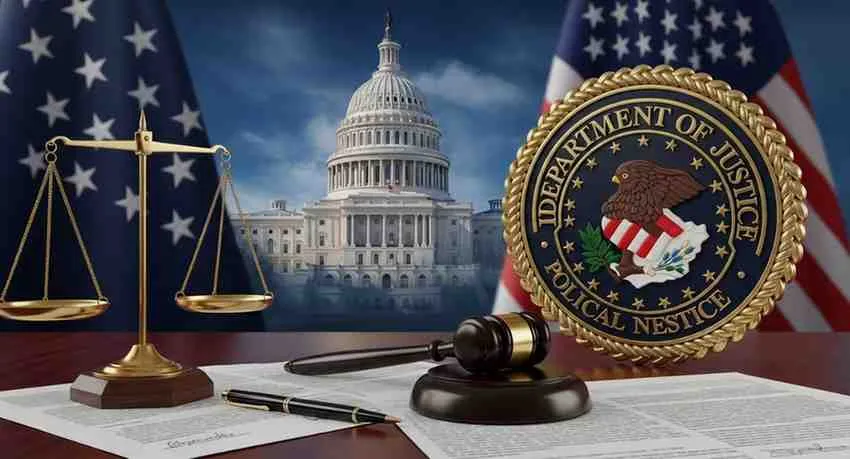When Representative Matt Gaetz abruptly withdrew from Attorney General consideration in November 2024, political shockwaves followed. The Matt Gaetz scandal represents one of the most dramatic examples of how serious allegations can derail even the highest political aspirations. This comprehensive analysis examines the timeline of events, the investigations that preceded his withdrawal, and what this case reveals about political accountability in modern America.
Readers will gain insight into the complex web of investigations, the reasons behind Gaetz’s withdrawal, and the broader implications for political immunity and scandal tolerance in contemporary politics.
Background of the Matt Gaetz Scandal
Who is Matt Gaetz and His Rise in Congress
Matt Gaetz emerged as one of the most prominent conservative voices in the House of Representatives, representing Florida’s 1st congressional district since 2017. Known for his fiery rhetoric and unwavering support of Donald Trump, Gaetz quickly became a media-savvy politician who thrived on controversy and confrontation.
The Florida Republican built his political brand on being a disruptor within the establishment, often challenging both Democratic opponents and Republican leadership. His aggressive style and frequent media appearances made him a household name among conservative voters, positioning him as a potential future leader within the Trump movement.
Gaetz’s political trajectory seemed unstoppable until serious allegations began surfacing in 2021. These accusations would eventually evolve into what became known as the Matt Gaetz scandal, fundamentally altering his career path and raising questions about accountability in high-profile political positions.
Attorney General Nomination Process Explained
The AG nomination process represents one of the most critical appointments in any presidential administration. The Attorney General serves as the nation’s top law enforcement official, overseeing the Department of Justice and ensuring the fair application of federal laws.
Presidential nominees must undergo rigorous Senate confirmation hearings, where senators from both parties scrutinize the candidate’s qualifications, experience, and ethical background. The process typically involves extensive background checks, FBI investigations, and public testimony before the Senate Judiciary Committee.
For controversial nominees, this process becomes particularly challenging. Senate Republicans and Democrats alike examine every aspect of a nominee’s record, looking for potential red flags that might compromise their ability to serve effectively. The Department of Justice investigation requirements demand that nominees maintain the highest ethical standards, given their role in overseeing federal law enforcement.
Timeline: What Happened with Matt Gaetz Scandal
The Matt Gaetz scandal unfolded over several years, involving multiple investigations and mounting allegations. Understanding this timeline is crucial to comprehending why his Attorney General nomination ultimately failed.
2021: Initial Investigations Begin The House Ethics Committee investigation first began in 2021, but was put on pause as the Justice Department conducted a sex trafficking investigation. Federal investigators began examining allegations of sex trafficking and related misconduct, creating the foundation for what would become a lengthy legal process.
2022-2023: DOJ Investigation Continues The Department of Justice conducted an extensive investigation into allegations against Gaetz. Investigators examined connections to Joel Greenberg, a former Florida tax collector who was sentenced to 11 years in prison in late 2022 after pleading guilty to crimes including wire fraud, stalking and sex trafficking a minor. This connection became central to understanding the broader scope of the allegations.
2024: House Ethics Committee Resumes The House Ethics Committee announced on Tuesday that it will continue to investigate certain allegations surrounding GOP Rep. Matt Gaetz, including whether Gaetz engaged in sexual misconduct, while ending other portions of the probe. The committee’s decision to continue certain aspects of their investigation kept the scandal in the public eye.
November 2024: AG Nomination and Withdrawal President-elect Trump’s announcement of Gaetz as his Attorney General pick immediately sparked controversy. Former Rep. Matt Gaetz, R-Fla., is withdrawing his candidacy to be President-elect Trump’s attorney general, after sex trafficking and drug use allegations threatened to imperil his confirmation.
December 2024: Ethics Report Released The committee released its 42-page report Monday morning after a lengthy investigation, detailing findings that would have significant implications for Gaetz’s political future.
Why Did Matt Gaetz Withdraw from AG Nomination?
Political Calculations and Senate Mathematics
Trump told him he didn’t have the votes in the Senate, according to reporting that revealed the mathematical reality facing the nomination. The withdrawal came after Gaetz wrote on social media that he was withdrawing and that his nomination “was unfairly becoming a distraction”.
The decision reflected careful political calculation. Senate Republicans, who would need to confirm any Attorney General nominee, expressed significant reservations about Gaetz’s candidacy. The ongoing investigations and mounting allegations created an untenable situation where confirmation seemed increasingly unlikely.
GOP Reaction to Gaetz Withdrawal varied significantly across the party spectrum. Some conservatives online expressed frustration with the withdrawal, viewing it as capitulation to political pressure. However, many Republican senators privately welcomed the decision, as it removed them from having to make difficult public votes on a controversial nominee.
The Role of Ongoing Investigations
The latest on Matt Gaetz scandal centered heavily on the House Ethics Committee’s investigation and its potential findings. The bipartisan House Ethics Committee was investigating Gaetz for allegations of sexual misconduct and illicit drug use before President-elect Donald Trump nominated him to be attorney general.
The timing of investigations created particular challenges for the nomination. Unlike typical background checks, Gaetz faced ongoing congressional scrutiny that could potentially reveal damaging information during the confirmation process. This uncertainty made his nomination a significant political risk for the incoming administration.
The prospect of public hearings where senators would question Gaetz about these allegations likely influenced the decision to withdraw. Such hearings would have created a spectacle that could overshadow other administration priorities and create lasting political damage.
Broader Implications of Political Immunity

Scandal Immunity in Politics vs. Presidential Immunity
The Matt Gaetz scandal raises important questions about scandal immunity in politics and how different standards apply to various political positions. While presidents may enjoy certain legal protections and political insulation from scandals, nominees for cabinet positions face different scrutiny levels.
Electorate tolerance for scandal has evolved significantly in recent decades. Voters increasingly demonstrate willingness to overlook certain controversies if they support a politician’s broader agenda. However, this tolerance has limits, particularly for positions requiring Senate confirmation and involving law enforcement responsibilities.
The concept of political career fallout varies dramatically depending on the specific circumstances and the politician’s base of support. Some politicians survive scandals that would end others’ careers, while seemingly minor controversies can derail promising political futures.
Public Perception and Accountability Standards
Public perception of scandals plays a crucial role in determining political outcomes. The Gaetz case demonstrates how allegations, even without criminal charges, can effectively end political aspirations. The court of public opinion often renders verdicts that formal legal processes cannot or do not provide.
Bipartisan concern over misconduct emerged as a significant factor in the Gaetz nomination withdrawal. When both Republicans and Democrats express reservations about a nominee’s fitness for office, confirmation becomes nearly impossible regardless of party control of the Senate.
The case illustrates how modern political accountability operates through multiple channels: legal investigations, ethics committees, media scrutiny, and public pressure. These overlapping systems create a complex environment where political survival requires navigating numerous potential pitfalls.
Case Studies and Historical Context
Comparing Political Scandal Survivors
Throughout American political history, numerous politicians have weathered serious scandals and maintained their careers. However, the Gaetz case demonstrates that certain factors make survival more difficult:
Position Sensitivity: Cabinet positions, particularly Attorney General, face higher scrutiny than legislative positions. The requirement to oversee law enforcement while facing misconduct allegations creates an inherent contradiction that voters and senators find difficult to accept.
Timing Factors: Scandals that emerge during confirmation processes face different dynamics than those affecting sitting officials. The pre-confirmation period allows opponents maximum leverage to prevent appointments rather than working to remove existing officeholders.
Support Network Strength: Politicians with stronger institutional support often survive scandals that would end others’ careers. Gaetz’s status as a polarizing figure within his own party likely limited the support available during his nomination crisis.
Historical Precedents for AG Nomination Withdrawals
The withdrawal of Attorney General nominees due to scandal or controversy has precedent in American political history. These cases typically involve questions about fitness for office, ethical violations, or political calculations about confirmation prospects.
Previous withdrawals demonstrate that even strong presidential support cannot overcome serious Senate resistance combined with significant ethical questions. The Attorney General position’s unique responsibilities require nominees to meet exceptionally high standards of public trust and legal integrity.
Analysis: Pros and Cons of High-Profile Political Scandals
Advantages of Public Scrutiny
Accountability Mechanisms: High-profile scandals serve important democratic functions by holding public officials accountable for their conduct. The intense scrutiny surrounding the Matt Gaetz scandal demonstrates how public attention can enforce behavioral standards that formal processes might miss.
Transparency Benefits: Media coverage and congressional investigations bring important information into public view. Citizens gain insights into the character and conduct of potential public servants, enabling more informed political decisions.
Institutional Protection: Scandals that prevent unsuitable candidates from assuming important positions protect institutional integrity. The Department of Justice’s reputation and effectiveness could have suffered if serious ethical questions about its leadership remained unresolved.
Disadvantages and Risks
Due Process Concerns: High-profile scandals can create trial-by-media situations where public judgment precedes legal determinations. The presumption of innocence becomes difficult to maintain in highly politicized environments.
Political Weaponization: Scandal allegations can become tools for political warfare rather than genuine accountability measures. Opponents may amplify relatively minor issues while downplaying more serious problems affecting their allies.
Chilling Effects: Excessive scandal focus might discourage qualified individuals from seeking public service, particularly those with complex backgrounds or controversial associations that could become political liabilities.
Frequently Asked Questions

Are Presidents Immune to Scandals?
Presidents enjoy certain legal immunities and political insulation that other officials lack. However, they are not immune to scandal consequences. Presidential immunity primarily protects against certain legal actions while in office but does not prevent political consequences, impeachment, or electoral defeat.
The presidency’s unique position creates different accountability dynamics than other political offices. Presidential scandals often require impeachment processes or electoral outcomes for resolution, while other officials face more immediate consequences through resignation, termination, or confirmation failure.
How Do Political Scandals Destroy Careers?
Political scandals destroy careers through multiple mechanisms:
Immediate Consequences: Resignation, firing, or nomination withdrawal often provides quick resolution to untenable political situations.
Electoral Impact: Scandals can make politicians unelectable by damaging their reputation with voters, donors, and political allies.
Institutional Rejection: Colleagues may distance themselves from scandal-plagued politicians, limiting their effectiveness and advancement opportunities.
Legal Ramifications: Criminal charges or civil lawsuits can end political careers even without convictions.
What Safeguards Does the DOJ Have Against Misconduct?
The Department of Justice maintains several safeguards against misconduct:
Inspector General Oversight: The DOJ Inspector General conducts independent investigations of department operations and personnel.
Professional Standards: Career prosecutors and investigators follow established protocols designed to prevent political interference and ensure legal integrity.
Congressional Oversight: House and Senate committees monitor DOJ operations and can investigate potential misconduct.
Judicial Review: Courts provide oversight of DOJ actions through various legal processes and appeals.
Public Accountability: Media coverage and public scrutiny create additional pressure for proper conduct.
The Future of Political Accountability
The Matt Gaetz scandal represents a case study in how modern political accountability operates in an era of intense media scrutiny and partisan polarization. Several trends emerge from this analysis:
Evolving Standards: Public expectations for political conduct continue evolving, with higher standards applied to certain positions. Attorney General nominees face particularly intense scrutiny due to their law enforcement responsibilities.
Process Importance: Confirmation processes serve crucial gatekeeping functions, preventing potentially problematic appointees from assuming critical positions. The Senate’s constitutional role in advice and consent provides essential democratic oversight.
Multi-Track Accountability: Modern political accountability operates through multiple channels simultaneously: legal investigations, ethics committees, media coverage, and public pressure. This system creates redundant safeguards but also potential for abuse.
Lessons for Political Immunity and Public Service
The case demonstrates several important lessons about political immunity and public service in contemporary America:
No Absolute Immunity: Even politicians with strong support networks and political backing cannot completely insulate themselves from serious misconduct allegations. The Matt Gaetz scandal shows how ethical questions can derail even the most ambitious political careers.
Context Matters: The same allegations that might be survivable in a legislative context can become disqualifying for executive positions requiring Senate confirmation. Different political roles carry different accountability standards.
Timing Is Critical: The emergence of scandal allegations during confirmation processes creates maximum political vulnerability. Pre-existing controversies make confirmation significantly more difficult regardless of other qualifications.
Institutional Integrity: Democratic institutions generally function to prevent unsuitable candidates from assuming critical positions, though the process can be messy and politically charged.

Conclusion
The Matt Gaetz scandal offers important insights into how political accountability operates in modern America. From his rapid rise as a Trump loyalist to his dramatic withdrawal from Attorney General consideration, Gaetz’s case demonstrates both the power and limitations of political immunity in contemporary politics.
Key takeaways include the critical role of Senate confirmation processes in maintaining government integrity, the multiple channels through which political accountability operates, and the evolving standards applied to different political positions. While scandal immunity in politics may protect some officials under certain circumstances, the Gaetz case shows that serious ethical questions can ultimately derail even the most promising political careers.
The broader implications extend beyond any individual politician to fundamental questions about democratic accountability, institutional integrity, and public service standards. As American politics continues evolving, the balance between political survival and ethical accountability remains a central tension in our democratic system.
Understanding these dynamics helps citizens make more informed political decisions and hold their representatives accountable. The Matt Gaetz scandal serves as a reminder that in a functioning democracy, no one is completely above scrutiny or immune from consequences.
What are your thoughts on political accountability and scandal immunity in modern politics? Share your perspective in the comments below and follow us for timely political analysis and breaking news updates on the latest political developments.
Related Reading:




